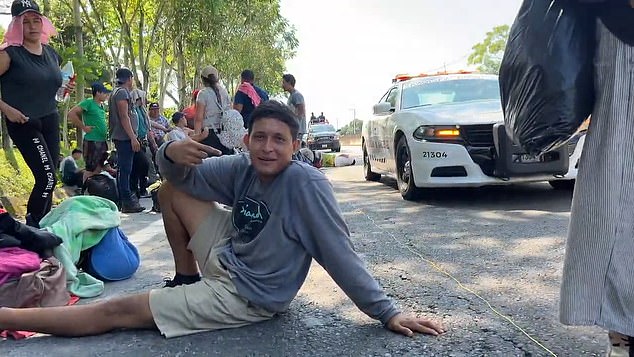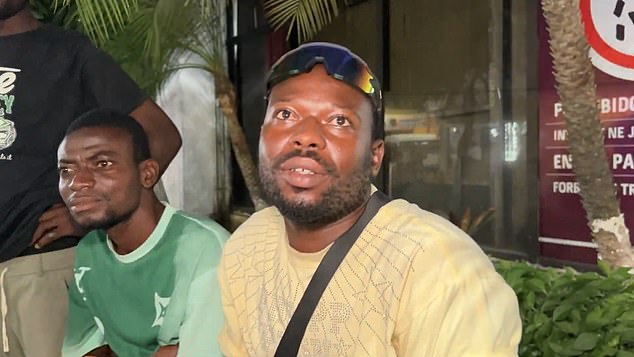‘We pray Trump DOESN’T win’: 150,000 migrants in Mexico are rushing to the border before the election – and tell TODD BENSMAN they’re terrified Donald will lock them out!
“I love Kamala Harris,” a young Venezuelan man declared last week as he rested on the side of a highway in southern Mexico.
His belongings were piled at his feet. Hundreds of fellow migrants stretched along the roadway in both directions.
They are heading to the US and almost all of them have an opinion about who the next president of America should be.
“Donald Trump, no,” the Venezuelan man said, shaking his head and making a cutting motion with his thumb across his throat.
He is one of thousands of migrants – from all over the world – joining a new stampede traveling north from southern Mexico towards the US border, less than two weeks before the presidential election.
I went to Tapachula in southwestern Mexico, near the border with Guatemala, to investigate why they were – again – on the move.
Throughout 2022 and 2023, massive caravans – some reportedly as large as 6,000 strong – became a common feature of the immigration crisis.
The mass migration became such a humanitarian and public relations disaster for the Biden-Harris administration that US Secretary of State Antony Blinken was dispatched to meet with the Mexican president in December 2023 to demand he impose stricter immigration controls.
He is one of thousands of migrants – from all over the world – joining a new stampede traveling north from southern Mexico towards the US border, less than two weeks before the presidential election. (Above) Migrant caravan near Tapachula, Mexico on October 20, 2024

“I love Kamala Harris,” a young Venezuelan man declared last week as he rested on the side of a highway in southern Mexico.
And the pressure campaign worked.
In January, I reported for DailyMail.com on Mexican police and military raids near the U.S. border.
Migrants who reached the northern provinces were detained and shipped hundreds of kilometers back south to towns such as Tapachula in the southwest or Villahermosa near the gulf.
The Mexican media dubbed it ‘Operation Carousel’.
And for almost ten months the caravans stood still.
But now they are back at work.
The migrants I spoke to on the road this week think this may be their last chance.
Many of them hope to reach the U.S. before Nov. 5 because they fear that Trump, if re-elected, will close the southern border and enforce long-standing immigration laws.
‘If [Trump] wins… one must do what the government says, [wait] It’s my turn,” said Carlos, a Honduran man in a caravan about 30 miles north of Tapachula.
In reality, it is unlikely that these migrants will be able to make the 2,100 kilometer journey in the next two weeks. But they can try.
And there’s an even more complicated reason why the caravans have started again: the Mexican government is encouraging them.
!['We pray Trump DOESN'T win': 150,000 migrants in Mexico are rushing to the border before the election - and tell TODD BENSMAN they're terrified Donald will lock them out! 4 'If [Trump] wins: one must do what the government says, [wait] It's my turn,](https://nybreaking.com/wp-content/uploads/2024/10/1729701331_263_We-pray-Trump-DOESNT-win-150000-migrants-in-Mexico-are.jpg)
‘If [Trump] wins… one must do what the government says, [wait] It’s my turn,” said Carlos, a Honduran man in a caravan about 30 miles north of Tapachula.
The caravans I traveled in were escorted by Mexican National Guard escorts, something I witnessed. Perhaps not only the migrants are becoming restless, but also the authorities.
For months, an estimated 150,000 migrants to the US have been trapped in increasingly dire conditions in Tapachula, as more and more migrants arrive from South and Central America.
The actual number gathering in southern Mexico could even be in the hundreds of thousands.
I’ve visited Tapachula at least five times in the last ten years and I’ve never seen it so busy. All hotels and motels are full. Migrant reception centers are operating at full capacity.
Those who cannot afford housing – including women and children – sleep on the streets and in city parks, packed in like sardines.
Remember this when you hear Vice President Kamala Harris touting new statistics that show a steep decline in the number of illegal U.S. border crossings by 2024.
She attributes the positive change to the recent enforcement of U.S. asylum laws. But that’s not the full story.
Even the Department of Homeland Security admitted earlier this month that the decline in illegal U.S. border crossings is partly due to “increased Mexican enforcement efforts.”
At the White House’s insistence, Mexico has held these people for months in southern towns like Tapachula and Villahermosa, which have come to resemble vast open-air refugee camps.
Now the situation is becoming untenable.
According to those I spoke with, the Mexican government’s promises to provide travel documents to the migrants never materialized.
In clear recognition of overcrowding, the U.S. government is now building a new migration processing facility in Tapachula.
Meanwhile, the Mexican government is beginning to transfer migrants from Tapachula to surrounding towns to ease growing pressure.
And the upcoming elections will only increase tensions.
A group of Ghanaian men in a busy park in Tapachula told me they feared a Trump presidency.
“We don’t like Donald Trump because he doesn’t like us,” one man said.
Kamala Harris is the preferred choice for him.
Another Ghanaian man said he plans to wait for the outcome of the election before taking his next step: “If after election day [Harris is elected]we know everything is fine, then we can go in.’

A group of Ghanaian men in a busy park in Tapachula told me they feared a Trump presidency. “We don’t like Donald Trump because he doesn’t like us,” one man said. Kamala Harris is the preferred choice for him.
A middle-aged Venezuelan man, also in the park, echoed these fears: “We know that if Donald Trump wins, all migrants will be expelled from the park. [United States]… we hope he doesn’t win.”
It’s still unclear how far north these migrant caravans will get before America votes — and I suspect many migrants just want to escape Tapachula.
But it certainly seems likely that after November 5, Mexico’s newly elected president will consider her country’s role in “Operation Carousel” complete and lift all remaining immigration controls.
That would mean that hundreds of thousands of migrants who have been waiting for the US elections in Mexico may – once again – try their luck by entering the US illegally.
As far as they are concerned, a Kamala Harris presidency would mean opening American borders.
If Donald Trump is elected president, their plans could change.
